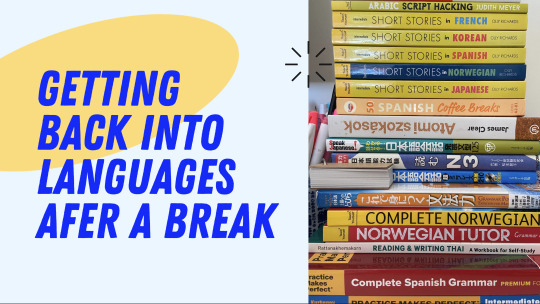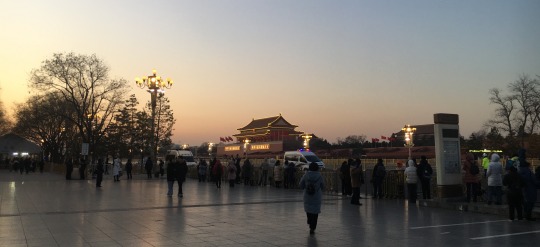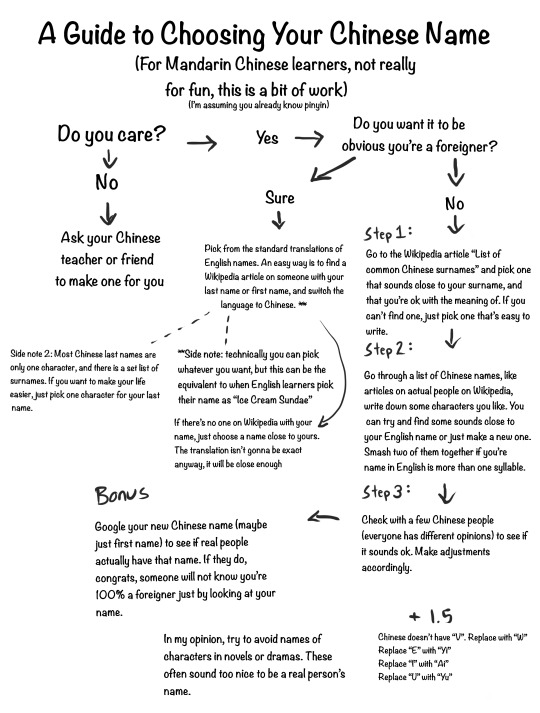Text
Wow
It has been over a year since I've been on here. I keep forgetting this blog, mainly because it works as an actual blog instead of a side blog. I want to keep all the posts that I had on here but easier to format. Or at least just easier for me to work with. I'm thinking of starting over on a different account, as an actual side blog. I just don't want to miss on the all resources I had and the accounts I followed.
0 notes
Text
“That's the beauty of learning a new language. It should feel like an enormous undertaking. It ought to intimidate you. It makes you appreciate the complexity of the ones you know already.”
- Babel: An Arcane History, R. F. Kuang
201 notes
·
View notes
Text
Learning a language after a break - tips for getting back on track
Learning a language after a break – tips for getting back on track
It’s OK to take a break
With apps that push streaks, YouTubers showing their highly productive morning routines, and social media pushing hustle culture, it’s easy to start to think that we need to perform at the same level of productivity each day.
I’ve found that my energy levels and mental health differs from week to week and I can’t have the same day or same week in terms of language…

View On WordPress
107 notes
·
View notes
Text
How to build a language self-study plan

So I’ve noticed, upon combing through pages and pages of youtube videos and google blogs, that rarely does anyone ever actually tell you what you should be studying. There’s a reason for this ! Everyone is different and at a different level, different motivation. It’s impossible to create a study plan that is perfect for everyone… which is why it can also be agonizing to make one for yourself.
“How am I supposed to know what’s important to study, if I don’t speak the language?”
Well that’s a good question! You need to gauge how far you’ve come so far and how far you’d like to get. It’s easiest when you are starting from zero because you can learn the alphabet, numbers, basic phrases, and basic grammar. Easy peasy. You can go cover to cover in a text book.
Here’s a check-list to create the perfect study plan special to you.
1. What do I know already? What do I need to work on?
- is it worth starting a textbook, if you feel like you already know half of it? It might be worth completing the given exercises and if you achieve an 80% or higher (or you could give that lesson to someone else) then you can move on from that specific point.
- create a list of the points that you still need to master
2. What do I need to include in a study session?
- naturally there needs to be a focus or a few different focuses of a study session, whether it’s a specific activity or a grammar point. I recommend creating a list of things you want to get done (a.) every day, (b) every week, and © every month. These goals must be quantifiable. For example, every week I read two news articles in German. As a reflection, I then write a summary of the event of the article as well as a personal opinion. That’s an easy box to check.
- you need a reflection. It’s important to really take time to reflect on how you feel about the time spent and the materials used. What could you do better next time? What went well?
3. When is the best time to study?
- are you more active/focused in the morning or in the night? The key is consistency. If you have a routine, you’re far more likely to adhere to it. I know that my own schedule is highly changeable and that can make it very difficult, but I’ve found if I wake up in the same period of time every morning, brush my teeth, make my bed, and then sit down to my work, I feel far more productive.
- how much should I study at a time? The recommended period is 25 minutes from the Pomodoro Method with a five minute break. You can research time-management techniques but ultimately it comes down to you.
4. How do I take notes ?
- IT”S ALL ABOUT YOU! What I do is take messy notes in classes or on my own and then I transcribe the finished page to my Notion page. It gives me a chance to make the notes neater and also to review a little bit. I will say though statistically, you will remember better if you write by hand.
- I like to have a column on each page for words I didn’t know
1K notes
·
View notes
Text
OMG GUYS (learning German) I FOUND A THING!
(Day 20/50 days of immersion)
There is a ONLINE LIBRARY of German books, magazines, movies and more. It's FREE (and legal I guess since it's the Goethe Institute who's behind it) for people learning German who don't live in Germany (from what I understood at least)!
(You can navigate the site in English too if needed)
It's by the Goethe Institute (them again! If you're learning German you might have already heard of them).
Setting up an account is a little tricky (need to create an account then go to the settings of the account on the Goethe Institute website to "activate" the library on the other website or something) but then you can access the books and other resources... for FREE and LEGALLY?
Basically it's like a library, you can borrow books/other resources for a certain amount of time if they aren't already borrowed by someone else or you have to wait!
767 notes
·
View notes
Text
as we get closer to january 1st and the “new year new me” feelings come crashing in, please keep in mind a few things:
there’s nothing inherently special about january 1st — you can start new habits any time of the year! expecting yourself to magically become a completely different person within 24 hours is unrealistic and will just make you feel like crap when you fail. instead, slowly implement better habits over a long period, focusing on only 1-2 realistic and sustainable SMART goals at a time. think about it, if you focus on building 1-2 new habits per month, in one year you’ll have between 12-24 new, healthy habits!
there’s nothing wrong with you and you don’t HAVE to jump on the latest new year fitness/diet trends or sign up for a gym membership. advertisers, influencers, and businesses are going to be looking for insecure people who have hope that “this time will be different.” again, please build sustainable habits over time if you do want to make changes, but please know that they’re not necessary.
if you do ultimately decide to sign up for a gym membership, buy a fitness regime online, or start following an influencer’s workout routine, please please please remember that being conventionally physically attractive, a model, or having thousands/millions of followers are not replacements for real certifications in fitness and nutrition. don’t put your health in the hands of people who just want to make a quick buck! how your body looks has a lot more to do with genetics than what workout you do. for example, you could follow an influencer’s routine and diet perfectly (not recommended) and still not have the same body — and that’s okay! also, there’s no need for most average people (i.e, not an athlete, fashion model, etc) to exercise for several hours per day every day.
in the same vein as the previous point, stay away from sketchy diet supplements of any kind (tiktok I’m looking at you)! most are not FDA approved and don’t even have the correct amounts the packaging says (aka, more or less than is printed on the label). also, there may be drug interactions if you take medication so always keep an eye out for that. if you see something that really, truly catches your eye and you absolutely can’t resist checking it out, look up the research on its claims. more than likely, there will be little to no scientific support. rule of thumb: if it sounds too good to be true, it is.
795 notes
·
View notes
Text
every time i see someone say that we should erase all other languages and make english the 'universal language' I'm reminded how ignorant and culturally insensitive some people are. to not be aware of the historical and cultural significance of a language in most cultures is bizarre. in erasing a language you would thus be erasing years of important history of a culture. i hope these people educate themselves before speaking on something they know nothing about simply because it would 'make their lives easier'. not to mention its so tone-deaf to the people who are fighting for language revitalization due to the historical language suppression of their ancestors.
860 notes
·
View notes
Text
this quiz will tell you where you're from based on your spanish, it's super fun to take and compare so tag your result! it's both for native and non native speakers :)
1K notes
·
View notes
Text
Chinese Time of Day Vocabulary
I’ve been keeping a list of words/characters related to times of day since last year. You probably know basic words like 早上, 上午, 晚上, etc. But there are so many other words and characters you may encounter in your language journey!
Note: this list isn’t meant to be complete.

Sunset (I think) by Tian’anmen Square about 3 years ago.
Dawn/early morning
天亮 tiānliàng - dawn / daybreak
日出 rìchū - sunrise
早 zǎo - early / morning / Good morning! / long ago / prematurely
一大早 yīdàzǎo - at dawn / at first light / first thing in the morning
早上 zǎoshang - early morning
旭 xù - dawn / rising sun
昕 xīn - dawn
晓 xiǎo - dawn / daybreak / to know / to let sb know / to make explicit
破晓 pòxiǎo - daybreak / dawn
晗 hán - before daybreak / dawn about to break
晞 xī - dawn / to dry in the sun
晨 chén - morning / dawn / daybreak
凌晨 língchén - very early in the morning / in the wee hours
早晨 zǎochén - early morning
晨曦 chénxī - first rays of morning sun / first glimmer of dawn
清晨 qīngchén - early morning
朝 zhāo - morning
朝阳 zhāoyáng - the morning sun
黎明 límíng - dawn / daybreak
The single characters above can be found in Chinese names. Some are quite common.
Keep reading
1K notes
·
View notes
Photo






chinese hanfu by 一殊汉服
251 notes
·
View notes
Text

Been learning Mandarin Chinese for ten plus years. Feel free to add more tips.
#using this#langblr#language learning#chinese langblr#mandarin chinese#中文#汉语#hmmm i think i have finally decided on a name#杨莉娜#杨 is bc thats what the chinese family name was before we were westernized#and then 莉娜 because it translates to jasmine and that's what my mom wanted to name before her friend stole it
333 notes
·
View notes
Text
i love you literal meanings i love you imperfect translations i love you figures of speech i love you language differences
#i love literal translations of things#it helps make things make sense to me#in a way to helps me form sentences because now phrases and expressions make sense#langblr
136 notes
·
View notes
Text
I just play my silly little games in my target language and pretend like that counts as studying
#me with gensin impact#i did understand a few words in chinese so thats a plus!#langblr#language learning#原神
312 notes
·
View notes
Photo





chinese hanfu by 无贰集
2K notes
·
View notes
Text
Writing “Chinese” in Chinese
Here is a little bit of information that I thought would be great to share!
So whenever I’m writing my tags or trying to introduce myself, I think about how I would actually write the name of my target language. So for example, to say “I am learning Spanish” I would write “ Estoy aprendiendo español”. The translation is simple. But for Chinese, that’s not the case.
There are differences in Chinese as it’s written versus when it’s spoken. There’s also differences between Mandarin Chinese and Cantonese Chinese. It was interesting trying to make sense of which ones to use and when, so I looked it up! I used several resources, which will be linked at the end.
Below, I have the noted words, with both Mandarin and Cantonese pinyin and jyutping to showcase how it’s pronounced. There are also detailed explanations as well. Anyway, here it goes!
Chinese (person): 中国人。 Zhōng guó rén / zung1 gwok3 jan4
The main reason why I placed this here is due to how English as a language works. When you look up how to say Chinese in Chinese, this will pop up. It’s only due to the fact that English uses words such Chinese, Spanish, etc to describe the language, people, and objects pertaining to that country. So we use “Chinese” for both “I am Chinese” and “I speak Chinese”. This not the case for other languages though. They have separate words for the language and the people. So in Chinese, to that say a Chinese person you use “中国人”.
This breaks down in multiple ways. 中 means middle and it’s commonly used to as an indication for China. 国 means country so when used with 中, it means middle country, or China. When having 人 , which means person, it becomes the meaning given above. All of this is important to know as 中 and the other characters will be used with this context in mind.
Chinese (written): 中文 zhōng wén / zung1 man4
This is mainly for Chinese as the written language. It can apply to all the languages under it (so mandarin, cantonese, etc). It can also be used for the spoken Chinese as well. This would be the simplest form to use when wanting to say “I’m learning Chinese.” This would not help with specifics though.
This is written like this due to 文 meaning writing, character, script, and language. With 中 meaning China, the two form together to create the meaning of “the written language of China”, “the Chinese written language,” or even a simple “Chinese writing”. It also can be seen as “Chinese Language” as well. This is why even though you can use this as a simple “Chinese”, it carries the idea of writing in Chinese.
In general, if you don’t mind the vagueness of 中文, then you can use it. But if you want to be specific in whether your learning Mandarin, Cantonese, etc, then use the ones below.
Mandarin Chinese (Han People): 汉语 hàn yǔ / hon3 jyu5
This is used to say the language of the Han people, which make up most of the Chinese population. This is understood to mean Mandarin and is commonly used for it. It is also used by teachers as well so while 中文 is used by everyday people to say Chinese, 汉语 might be used in schools to specify Mandarin.
This is broken down by 汉 meaning the Han people, an ethnic group that makes up most of the population in China, and 语 meaning language, tongue, or expression. This means that with the two combined, it brings the idea of “Han language” or “language of the Han people”. It is used more often to refer to the spoken language of Chinese, such as Mandarin.
Small note: I went back through to double check this post and it seems that for some speakers, this actually does refer to other dialects/languages. Some have noted that people can use this to also mean Cantonese as well, although several articles go against this.
Mandarin Chinese (Common Language): 普通话 pútōng huà / pou2 tung1 waa2
This is used to also say Mandarin Chinese, but through the idea of a “common language” or “common dialect”. It’s from the idea of speaking in the common dialect, which in China and learning settings, would be Mandarin. This is how the Chinese government puts their official language.
This can be broken down by 普 meaning universal, general, widespread, 通 meaning pass through, common, communicate, and 话 meaning speak, talk, communicate, dialect. This all comes together to form the idea of a common dialect.
I am curious if this meaning for Mandarin Chinese changes depending on environment. If one is in an environment where most speakers speak Cantonese, would 普通话 mean Cantonese instead? Would love to know!
Mandarin Chinese (Taiwan): 国语 guóyǔ / gwok3 jyu5
This version is used primarily in Taiwan. It means “language of the country” or “country language”. This doesn’t explain much about the exact language is it, but since Mandarin is spoken in Taiwan, using this word to describe Mandarin makes sense. It’s the idea of speaking the country or national language, aka Mandarin.
This word can be broken down by 国 and 语。Both of which have been explained above.
Mandarin Chinese (Overseas): 华语 huáyǔ / waa4 jyu5
Now in in the articles I looked at, they note that even in overseas communities there are different words for Mandarin. This version is used mainly in South East Asian countries, such as Singapore and Malaysia. This time though, the ideas behind the characters are a bit more complex in nature.
The characters can be broken down by 华 and 语. While 语 has been explained before, 华 carries a much more complicated history. Just as 中 can mean “Middle” while also being used to mean China, 华 does the same. 华 means splendid, magnificent, and flowery, but it’s not this meaning that 华语 is using. That is due to 华 being used in the word 华夏, which is a concept of the Chinese civilization and nation. It’s an awareness of the Han people and their ancestors.
夏 is the name of the very fist Chinese Dynasty, the one that formed the country. Having 华夏 together brings this idea of a great dynasty and the importance it holds for Chinese communities and their shared history. So for Chinese people in places such as Singapore and Malaysia, it’s way for them to connect to their ancestry. They can also connect with their language through this, hence 华语。
This all comes together to bring the idea of Chinese people in Singapore speaking the language of their people or ancestors, which in most cases is understood to be Mandarin. The language of their Han ancestors, 华语,is Mandarin.
Mandarin (Officialese): 官话 guān huà / gun1 waa2
This one is very straight forward, but is also used in many different contexts. 官 means official, bureaucratic, or government. When this is combined with 话, it takes on the meaning of official language, which in China is Mandarin. This isn’t it’s only meaning though. It can also be used to say bureaucratic language or even used to mock or joke about “official language” or “officialese”. So be mindful that this isn’t used to only mean Mandarin.
Mandarin (Northern Dialect): 北方方言 běi fāng fāng yán / baak1 fong1 fong1 jin4
This one is actually quite simple! The first part of this is 北方, which means north or northern. The second part, 方言, means topolect, which is sorta like a dialect. This very easily translates into northern topolect/dialect. This encompasses all the dialects of northern, north eastern, and south westward China into one thing of “Mandarin”. This is only really used in linguistic circles. It wasn’t in the main articles and only brought up in terms of linguistics so using this is not very important. It’s only for technicalities.
So far this is all that I have found for Mandarin but, there are also several ways to say Cantonese as well.
Cantonese (Hong Kong): 粤语 yuèyǔ / jyut6 jyu5
This word is mainly used in Hong Kong. This variation is also complex in it’s meaning as it brings older ideas of the southern provinces in China. 语 has already been explained previously but 粤 carries much more history. When looking up 粤, it doesn’t show much detail other than just “Cantonese” or “Guangdong or Gaungxi province”. But if you look at the radical used in the character, this brings more information.
In the character 粤, there is the radical 米. This radical has the meaning of husked rice or grains of rice. This brings about the ideas of 粤 relating to rice, and in turn the language of things associated with rice. This is amazing because rice was traditionally cultivated in southern china. Rice was made in the south due to the warm and wet climate. Now, the south is associated with Rice. There is even an on going stereotype that southern Chinese people love rice and rice related things.
So Cantonese, which tends to be spoken in southern China, is referred to as 粤语, a word that is related to rice. It all comes together in this cool way that otherwise would not have been known without going into the radical.
Cantonese (Mainland China): 广东话 guǎngdōnghuà / jim2 dung1 waa2 or 6
This version is used by those in mainland china. The word gains its meaning from the region of 广东, which is a province in southern China where most of the population speaks Cantonese. (Where my Chinese ancestors are from :D ) Because of this, Cantonese is referred to as 广东话, or “Guangdong Language” or “Guangdong Dialect”.
This is very simple to break down as 话 was explained previously. 广东 is simply the name of the region in southern China. The character 广 means wide, extensive, and broad. The character 东 means east, host, or owner. I’m not sure on the history of why the southern provinces are named this way, but it is interesting to know. I will probably make a post explaining this history when or if I find I out.
Cantonese 白话 báihuà / baak6 waa2
This version of saying “Cantonese” is very very informal. It’s a term that’s very colloquial. It’s reportedly not used in Hong Kong, but can still be used in Mainland China. It’s a term that has many other uses and meanings so it’s not wise to use it only to say “Cantonese”. It can mean gossip, chit-chat, or even baseless claims. This is all derived from it’s characters.
白 means white, but just like many other languages, white isn’t only to say the color. 白 is also used to mean blank, clear, or plain. With this, when combined with 话, it gives off the idea of speaking very plainly and/or having nothing of value to your talk in either gossip or no evidence to back up claims.
It’s versatile in it’s use due to this, but those who use it to mean Cantonese are probably using it to make Cantonese seem like the “common” or “plain” language used. It’s the same idea of 普通话, where it’s the common tongue or dialect. Or at least that’s how I’m interpreting it.
This is all I have in terms of how to say “Chinese” in Chinese. I realize only after making this post that I did not use traditional characters at all. This would only change the appearance of the characters, not the pronunciation or use of the characters. Anyway, besides this I hope this post proved to be helpful and allowed many of you to learn something new! My sources are now listed below!
Sources:
https://goeastmandarin.com/how-say-chinese-language-mandarin-chinese/
https://www.duchinese.net/blog/91-how-to-say-chinese-in-chinese/
https://www.tutormandarin.net/en/5-ways-how-to-say-chinese-in-chinese/
https://www.quora.com/How-do-you-write-Cantonese-in-Cantonese
https://www.quora.com/What-is-the-Mandarin-word-for-Mandarin
https://www.mdbg.net/chinese/dictionary
https://www.pleco.com/
#langblr#language leanring#peachycanton#chinese#chinese langblr#mandarin chinese#cantonese chinese#cantonese#Mandarin Vocabulary#Cantonese vocab#中文#汉语#普通话#国语#华语#官话#北方方言#粤语#广东话#白话#long post#cantonese vocabulary#mandarin vocab#mandarin langblr#chinese vocab#Chinese Vocabulary#so many tags omg#this took me days and i'm so tired#i just kept finding more things to add to my notes#please correct me if i'm wrong about anything
41 notes
·
View notes
Note
Your recent post mentioning the merits of country-wide bilingualism reminded me of something: One of my friends in secondary school (in mid 00s NL) was involved in something like a model European Parliament or European debate programme, where once a year representative students from EU countries would meet up somewhere and debate stuff.
Everyone at this event could speak English + their own language, and perhaps some German or French. That is, except for the UK delegation*. So what invariably happened is that on Day 1 everyone would talk shit (during free time) in their own language about the other countries, except the UK delegation could not, because everyone understood them.** On Day 2, countries with similar languages, (e.g. Benelux/Germany/Denmark/Sweden, Portugal/Spain/Italy/France) would band together and talk shit with each other, still in their own languages but they'd be mutually intelligible. And finally on Day 3 these groups built bridges between each other using their limited knowledge of French/German/Latin/Ancient Greek to make one supergroup just to talk shit about the UKers because they were the only ones who didn't understand any other language (and Day 2 attempts at inclusion were met with demands that English would be easier for everyone).
My friend qualified for this thing 3 years in a row and it happened every time without fail. It made us all wonder if this is what happens in the actual EU parliament as well.
*afaik there were only English people in the UK delegations.
** The Irish delegation was able to talk shit about the English by speaking Irish or English with extra thick accents that were impenetrable to others, allowing them into the European alliance. One year someone from Ireland was caught passing info to the UK and Ireland was booted, a huge scandal that no one expected and the word "ierlandverrader" (portmanteau of ireland and land traitor) became a meme among my friends for a while.
This is HILARIOUS
#OMG THIS IS FUNNY#i had caps lock on but the feeling still applies#language#language learning#long post
2K notes
·
View notes
Text
不露声色 (不动声色)

大家好!好久不见!
Hello everyone I am back with another 成语 aka Chinese idiom or proverb! This week's story is 不露声色 (bù lù shēng sè), or in another form, 不动声色 (bù dòng shēng sè), which translates to "not a word or movement", meaning to not show one's feeling or intentions. Equivalent phrases in English are "remain calm and collected" and to "not bat an eye". I found that this story is not as clever as some others, but the idiom is useful. Let's get to it!
In his later years, Tang emperor Xuánzōng had slowed down quite a bit, trading his firm spirit for the pleasures of life and sweet words in his ears. One day he needed to assign someone to the position of prime minister from a set of shady characters with in central government. One of these is Lǐ Línfǔ, a particularly wily minister, who knows how to garner favor, flatter, and sweet-talk the emperor. However, he also has a dark side, known for cozying up to those with good favor, then eliminating them once the emperor gives them the cold shoulder, and had a secret bad habit of framing people for crimes to get them removed from the court. He did all this without even batting an eye (从来都是不动声色). As a result, the emperor does not know this, or at least thinks it's worth it for the sweet words.
Before making his decision, the emperor first decided to consult with his senior prime minister, Zhāng Jiǔlíng, who is experienced and known for his bluntness. Thinking of Lǐ Línfǔ's behavior, he plainly explains: "The prime minister is an important role for the safety of our country. I fear that if you assign someone like Lǐ Línfǔ to the post, our country will be in danger." The emperor was disappointed to hear this.
Some years later, after Lǐ Línfǔ had successfully become prime minister, the emperor suddenly recalled another man, Yán Tǐngzhī, who was known for being upstanding and virtuous, looked down upon Lǐ Línfǔ, and was previously recommended by Zhāng Jiǔlíng specifically for these reasons. The emperor spoke out: "Where is Yán Tǐngzhī now? He has some skills, perhaps we can assign him to a position." However, Yán Tǐngzhī had already been assigned to a different province at that time. Lǐ Línfǔ went out and found Yán Tǐngzhī's younger brother and said: "Why don't you write a letter to the capital saying that your brother is sick and wants to return to the capital to receive treatment?” The brother, believing that Lǐ Línfǔ had good intentions, immediately set off to do this. Lǐ Línfǔ returned to the court and told the emperor: “Unfortunately Yán Tǐngzhī has become quite old and of feeble body, you should instead allow him to enjoy retirement.” The emperor was disappointed and decided to wait for Yán Tǐngzhī to return to the capital, only giving him the position of sinecure (a position of practically no obligations).
And that’s it! Did you enjoy the story? Seems the sneaky guy got his way, but I hear that’s mostly how it went in these historical courts. I had never heard the term “sinecure” before either, so I learned some English from reading this story too!
Here are the other idioms from within the story:
阿谀奉承 (ē yú fèng chéng) - flattering and fawning (idiom); sweet-talking
口蜜腹剑 (kǒu mì fù jiàn) - lit. honeyed words, a sword in the belly (idiom); fig. hypocritical and murderous
见风使舵 (jiàn fēng shǐ duò) - lit. see the wind and set the helm (idiom); fig. to act pragmatically; to be flexible and take advantage of the situation
转弯抹角 (zhuǎn wān mò jiǎo) aka 拐弯抹角 (guǎi wān mò jiǎo) - lit. going round the curves and skirting the corners (idiom) fig. to speak in a roundabout way, "to beat around the bush"
落井下石 (luò jǐng xià shí) - to throw stones at sb who fell down a well (idiom); to hit a person who is down
See you next time!
#language learning#langblr#chinese#mandarin chinese#chinese idiom#ooo#this is nice#chinese vocab#mandarin vocab#中文#汉语#普通话
9 notes
·
View notes